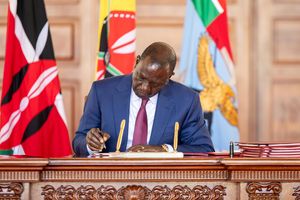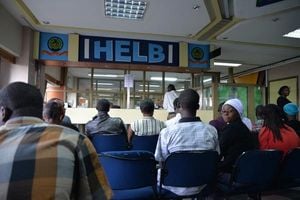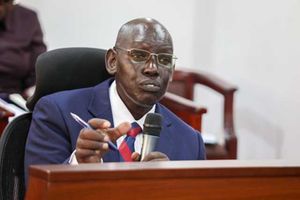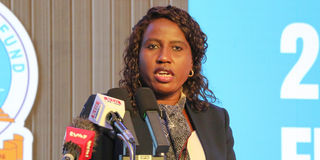
Principal Secretary for Higher Education Dr Beatrice Muganda makes her address during the Second Biennial Conference on Funding Higher Education in Naivasha on February 26, 2025.
The government has acknowledged challenges in admitting university students who completed their secondary education in 2024 due to legal technicalities affecting higher education funding.
This comes after the High Court declined to grant a stay order on its December 20, 2024, ruling, which quashed the government’s funding model introduced in 2023.
The Kenya Universities and Colleges Central Placement Service (KUCCPS) had sought the stay order to allow placement to proceed while the government appealed the ruling. However, the court’s decision has prolonged uncertainty for 246,391 students who attained the minimum university entry grade of C+ and above in the 2024 Kenya Certificate of Secondary Education (KCSE) examinations.
On Wednesday, Education Cabinet Secretary Julius Ogamba stated that the Ministry of Education is consulting various government agencies before advising on when the KUCCPS portal will open for university applications. The delay means that thousands of students now face uncertainty regarding their admission and financial support.
“The true elephant in the room is how to adequately fund the 246,391 KCSE 2024 candidates who qualified for university. Can we afford to provide full loans and scholarships to all first-year students while still catering for continuing students? Should we determine an optimal number that the government can afford to sponsor while allowing others to seek alternative funding?” posed Mr Ogamba.
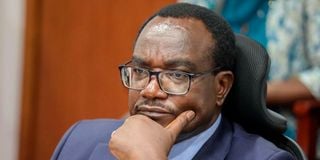
Education Cabinet Secretary Julius Migos Ogamba appearing before the Senate Committee on Education at Bunge Tower Nairobi on December 5, 2024.
His remarks, read by Principal Secretary for Higher Education Beatrice Inyangala during the Second Biennial Conference on Funding Higher Education in Naivasha, highlighted the financial strain facing the government. According to Mr Ogamba, at least Sh25.85 billion is required to fund first-year students in the 2025-2026 financial year.
Despite the uncertainty, he assured parents and students that the nullification of the 2023 funding model would not affect university admissions. He added that a committee appointed by President William Ruto to review the funding system had completed its work, and its report was awaiting presidential approval.
Dr Inyangala expressed confidence that the court would provide clarity, enabling the placement process to proceed smoothly. The conference, attended by university vice-chancellors, policymakers from the Ministry of Education and the National Treasury, private sector representatives, and development partners, focused on the funding crisis and potential solutions.
“I want to assure parents that all students who scored a C+ and above will have an opportunity to register and receive funding before the September intake,” Dr Inyangala said.
The High Court ruling, delivered by Justice Chacha Mwita, declared the government’s funding model unconstitutional, triggering concerns over university financing. The National Assembly Education Committee has since engaged stakeholders to seek a resolution.
“Due to a lack of clarity in the ruling, KUCCPS filed an application seeking the suspension of Justice Mwita’s judgment to allow it to proceed with its functions. We are also advocating for a directive that will enable the process to continue,” said Kitutu Masaba MP Clive Gisairo, a member of the committee.
The placement process is time-sensitive, as government-sponsored students traditionally report to universities in September. The delayed decision could disrupt the academic calendar if not resolved soon.
In the 2024 KCSE exams, 246,391 students met the minimum university entry requirement of C+ and above out of 962,512 candidates. Among them, 1,693 candidates scored an A (Plain), 7,743 scored an A-, 19,150 attained a B+, 43,120 secured a B (Plain), 75,347 scored a B-, and 99,338 received a C+.
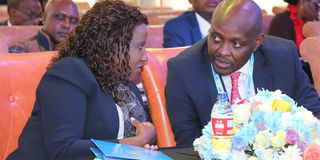
Principal Secretary for Higher Education Dr Beatrice Muganda converses with University Fund CEO Geoffrey Monari during the Second Biennial Conference on Funding Higher Education in Naivasha on February 26, 2025.
Normally, once KCSE results are announced, the Education Cabinet Secretary directs KUCCPS to commence the selection and placement process. However, this year, Mr Ogamba has yet to announce available university slots or confirm the number of students the government will sponsor.
Universities, through Professor Daniel Mugendi, chair of the Vice-Chancellors’ Committee, have called for urgent engagement to prevent a crisis. The 2024 KCSE cohort would have been the third group under the now-nullified model, which allocated financial support based on students’ financial need.
Meanwhile, Dr Inyangala urged universities to diversify their revenue sources instead of relying solely on government funding.
“Government funding alone is insufficient to provide the desired quality of education,” she stated.


